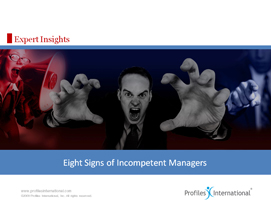Eight Signs of Incompetent Managers
May 16th, 2011 by Michael Page

Effective managers do more than just supervise employees. They take responsibility for ensuring that an individual succeeds, and that the team, department, or business unit achieves expected results. Effective managers are like successful coaches who develop teams that win championships year after year.
Like winning coaches, successful managers are both talented and skilled. Of course, managerial skills can be developed through training, mentoring, and experience. But if a manager lacks natural talent, his or her odds of success will diminish significantly.
To keep your team winning avoid these eight signs of incompetent managers:
- Poor relationship-building skills
Poor communicators forget that manager-employee communication is a two-way street. They talk (some more effectively than others), but they seldom listen. Often they don’t read subtle cues from other people’s gestures and tend to interrupt when others are speaking. - Weak leadership capabilities
Sometimes it’s tough to speak the plain but inconvenient truth when people really need to hear it. Great leaders can set an example; they walk the walk and talk the talk. Weak leaders are sometimes afraid to bruise egos – including their own. - Inability or unwillingness to adapt to change
Change is hard. But effective managers know how to handle it. They can adjust to new circumstances. In a crisis, they seek solutions. It’s often been said that the only constant is change. On the other hand, those who can’t adapt to change:- panic when faced with unexpected problems and sudden crises. They expect the worst
- get stuck in reactive mode instead of proactively developing contingency plans
- don’t think creatively to overcome obstacles
- they’re reluctant to involve others in the problem-solving process, even when they have more experience or can bring a fresh perspective to the table
- Poor relationship-building skills
Relationships – professional as well as personal – require some work. For example, good communication is a cornerstone of a healthy, productive relationship. So are trust and respect. Good relationship builders respect people’s differences; they’re tolerant. They praise more than they criticize. And when they do criticize they focus on the behavior, not the people. They’re always careful not to embarrass other people. And they say what needs to be said – even when it’s uncomfortable to say it.Aside from neglecting to maintain strong personal relationships, poor relationship builders:
- fail to respect the team or show appreciation for other experiences and viewpoints
- criticize people instead of people’s behaviors. They rarely offer specific, constructive suggestions for improvement
- don’t regulate their emotions well, especially during times of stress.
- Ineffective task management
Effective task managers know how to establish priorities and make sure work gets done! They can see the big picture and break it down into specific tasks required to complete a project. They are skilled at assessing their resources, allotting time and materials, motivating people on the job, and ensuring that each and every milestone and deliverable is accomplished on time and on budget.Ineffective task managers:
- do not ask for help when they need it
- procrastinate, especially when a big project seems overwhelming
- tend to blame others for their own lack of oversight
- Insufficient production
Insufficient production can have myriad causes. It could be a simple lack of resources or funding; it could be unrealistic expectations. Some managers lack the technical knowledge to ensure that production demands are met. And, of course, some people lack a sense of urgency, even on matters that are critical to the organization.These managers:
- find plenty of reasons not to make a decision
- waffle, remain indecisive and show insensitivity about holding up projects
- are easily distracted, unreliable and erratic
- Poor developer of others
Just like relationship building, developing other people’s talents is an art. Developing others can be hard work. Not everyone is naturally capable of delivering constructive criticism. Nor is everyone observant enough to make note of another person’s habits, including the habits that need to change. Being a role model or a mentor takes commitment. Unfortunately, not all role models and mentors recognize that. They think their protégés will simply observe and learn. But the fact is, developing skills and talents in others takes much more than just showing up. - Neglectful of own personal development
It sounds reasonable enough, but we’ve observed many managers who fail to develop their own communication styles, organizational skills or work habits. They might claim that they’re committed to the organization or the team, but unless they’re willing to continually improve their own skills and talents, how will they ever recognize how important personal development is for the whole team? - Building Great Teams
- Cultivating Effective Leaders
- Developing Employees
- Improving Front-line Management
- Reducing Conflict, Theft & Absenteeism
- Selecting and Organizing People
In a recent study of more than 350 companies, Bersin & Associates found that 360-degree feedback, leadership style and personality are the three most common assessments for managers, regardless of level. Read this month’s case study and learn more about how Loomis, a multinational cash-handling corporation, uses leadership development to reduce turnover.
The Profiles Research Institute is a website designed to gather data from survey responses. We have strategically placed the surveys into 6 different “management categories” where research would have maximum impact and value. The management categories are:
Survey responses have been analyzed and segmented into reports identifying trends and best practices.
Profiles Research Institute provides us with real-time data from today’s businesses where challenges, trends, best practices are identified as well as opportunities for Profiles. With fresh data available each quarter we are able to track trends and shifts as organizations address today’s business challenges.
Three easy steps to the latest research:
1. Go to www.profilesresearch.com
2. Participate in as many surveys as you like
3. Then download the research report at the end of each survey
